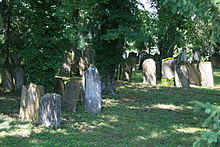Melnitz
Melnitz is a novel by the Swiss writer Charles Lewinsky , published in hardcover in 2006 by Nagel & Kimche Verlag , and in paperback by dtv in 2007 .
The novel exemplarily traces the history of the Jews in Switzerland over four generations; the author calls the book a “saga of a Jewish Swiss family between 1871 and 1945”. Melnitz was celebrated as a great success in the entire German-speaking area , compared with works by Flaubert , Fontane and Gottfried Keller and referred to as Lewinsky's main work. This is all the more remarkable as the author has so far become known primarily as a screenwriter for sitcoms ( Fascht e Familie and Fertig Lustig ) as well as through radio plays and popular song texts .
action
The book consists of five chapters. They are only overwritten with the year and are further subdivided into numbered subsections. The first chapter «1871» takes place in Endingen in Aargau . Here Salomon Meijer, his wife Golde, his spoiled daughter Mimi and his adopted daughter Chanele as well as other Jewish and Christian residents of the "Jewish village" are presented. As a cattle dealer , Salomon Meijer has achieved some prosperity. In the following chapter, «1893», the focus shifts to the nearby small town of Baden . Now the debates about the introduction of the anti-Semitically motivated ban on slaughter are described, which is still in force today. The beginning of the chapter "1913" takes place in Zurich , where the family gathers for a seder evening . The First World War comes up later .
The horrors of National Socialism are reflected in the chapter «1937». Ruben Kamionker, the grandson of Salomon Meijer's adopted daughter Chanele, fell victim to National Socialist terror as a rabbi in Halberstadt with his family. Finally, «1945» is a short epilogue with a look back at the Holocaust . The refrain “Whenever he died, he came back” refers to the eponymous uncle Melnitz, “who got his name from Khmyelnitski ”. Melnitz acts as the narrator's counterpart and, as a revenant , embodies "the never-to-be-erased memory of Jewish history shaped by persecution".
The appendix contains a carefully researched glossary of Yiddish and Hebrew expressions.
Reception and awards
Melnitz has been translated into Chinese, Danish, English, French, Hebrew, Italian, Croatian, Dutch, Swedish, Spanish and Turkish. In 2008 the French translation was awarded the Prix du Meilleur livre étranger . In the same year, the Chinese version received the award for "Best Foreign Novel" by the Foreign Literature Learned Society in Beijing . In addition, the book received the Swiss “Prix Lipp Suisse” in 2009. In 2013 Melnitz was performed as a play in the Kurtheater Baden .
Book editions
- Melnitz . Novel. Nagel & Kimche, Zurich 2006, ISBN 3-312-00372-5 .
- Melnitz . Novel. Deutscher Taschenbuch Verlag, Munich 2007, ISBN 978-3-423-13592-4 .
Individual evidence
- ↑ p. 757 of the paperback edition
- ^ "Melnitz" as a play - at the "location of the event" in Baden Andreas Klaeui, SRF , October 21, 2013
Web links
- Charles Lewinsky zu Melnitz on his website
- And then Uncle Melnitz Hendrik Werner came to Die Welt on January 4, 2006
- Pearl divers
- Interview with Charles Lewinsky Franziska Streun , in: Berner Zeitung , June 20, 2011

